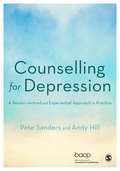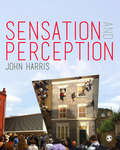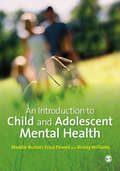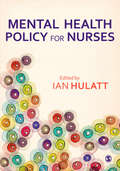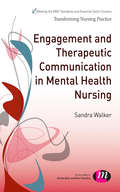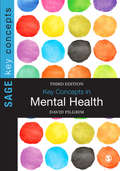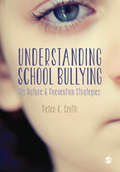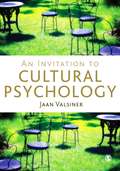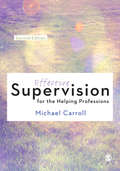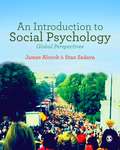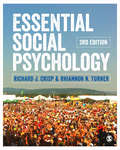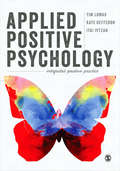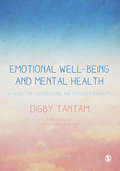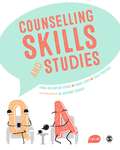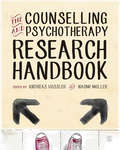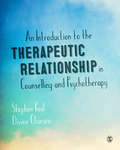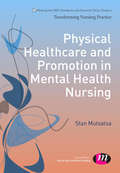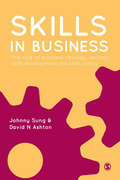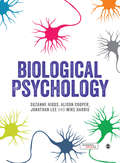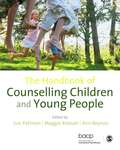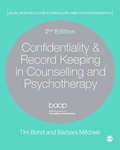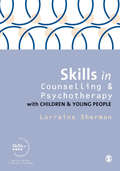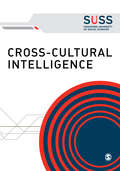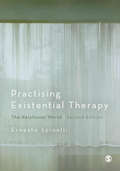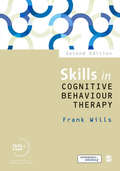- Table View
- List View
Counselling for Depression: A Person-centred and Experiential Approach to Practice
by Pete Sanders Andy HillThis is the first book to take a humanistic - person-centred/experiential - approach to counselling to the most commonly presenting client issue, depression. A landmark text, it establishes humanistic counselling as an evidence-based psychological intervention and is essential reading for trainees wishing to work in public health settings. Chapters cover: · Evidence-based practice and person-centred and experiential therapies · Counselling for Depression competence framework · Working briefly · the Counselling for Depression therapeutic stance · In-depth case studies illustrating Counselling for Depression in practice · Training, Supervision and Research. The book further includes lists of CfD competences, research data supporting the approach, and sources used in developing the Humanistic Competence Framework This will be vital reading for those taking CfD training or a humanistic counselling and psychotherapy course, as well as for those already working within the NHS wishing to enhance their practice. Andy Hill is an accredited counsellor, an experienced trainer and Head of Research at the British Association for Counselling and Psychotherapy. Pete Sanders is retired person-centred therapist, who now acts acts as a trainer, with a special interest in Pre Therapy. He founded PCCS training and PCCS books with his wife Maggie.
Sensation and Perception
by John HarrisSensation and Perception covers in detail the perceptual processes related to vision and hearing, taste and smell, touch and pain as well as the vestibular and proprioceptive systems. Individual chapters cover separate topics including the fast-developing areas of perception of emotions and attractiveness and recognition of faces, plus newer topics not seen regularly in other textbooks, for example changes in perception throughout the lifespan and pathologies of perception.<P><P> Key features:<P> * Chapters begin with summaries of key topics and questions to aid learning <P> * Includes key points, spotlights on research, and 'Thinking about Research' sections, designed to encourage students to design their own studies <P> * Chapters close with 'Test Yourself' questions, a review of key terms and annotated further readings <P> A Companion Website offers additional resources for lecturers and students available on publication at: www.sagepub.co.uk/harris
An Introduction to Child and Adolescent Mental Health
by Erica Pavord Briony Williams Maddie BurtonAnyone who works within children and adolescent mental health services will tell you what a challenging and complex world it is. To help prepare you, the authors have produced a clear introduction to child and adolescent mental health that takes you step-by-step on a journey through the subject. Beginning with the foundations, the book explores the common mental health concepts and influences that you can expect to encounter examining topics like the difference between emotional and mental health issues and how mental health problems develop. It then moves on to explore the vital skills that you will need to develop like effective communication and basic counselling skills, and introduces some of the common interventions like Cognitive Behavioural Therapy, Psychodynamic theory and Family work. Written by a multi-disciplinary team of passionate and experienced experts, the book strikes an effective balance between introducing the relevant theory and showing how this can be applied in the real world. It is an essential starting point to the subject of child and adolescent mental health and suitable for any students planning to support this group.
Mental Health Policy for Nurses
by Ian HulattMental health nursing has been shaped by a variety of policy factors in the past 50 years. In this new textbook, edited by the mental health policy advisor to the Royal College of Nursing, a range of experts in their field introduce the essential elements of policy and legislation to new students and experienced practitioners which will affect them throughout their careers. Clinical examples are drawn on throughout, to help students think about the real-life context of what can be a difficult subject.
Engagement and Therapeutic Communication in Mental Health Nursing (Transforming Nursing Practice)
by Sandra WalkerBeing able to engage with service users and communicate effectively is a fundamental skill identified by the NMC and required of all mental health nurses. The reality is that building rapport and developing therapeutic relationships does not come instinctively for everyone. The authors have responded to this with a book that explains the different communication theories and models and goes on to show students how they work in the real world. Innovative exercises encourage reflection and enable students to practice their developing communication skills as they progress. Throughout the book the authors are focussed on promoting recovery and have put the service user at the centre of the discussion, ensuring that their voice is heard. Key features: - Covers the communication content of the new NMC Standards and Essential Skills Clusters for pre-registration degree-level nursing education - Focussed on promoting recovery and adopts a person-centred approach - Interactive style using realistic scenarios and case studies making theory easy to apply to practice - Includes a chapter co-authored by a service user offering a unique insight.
Key Concepts in Mental Health
by David PilgrimThis is the only text to give you a complete, concise overview of mental health and all the issues that surround it from a theoretical and practical point of view. Split into three sections, the book defines mental health and mental illness, examines the services and settings in which mental health care takes place and discusses the societal issues surrounding mental health. Made up of 63 bite-sized chapters, the book offers: · Definitions of the key concepts · Key points that you need to know for your study and practice · Further reading to help you expand your knowledge It will be essential reading for students of health, nursing, mental health, social work and social care. It is also valuable reading for students of counselling and psychotherapy.
Understanding School Bullying: Its Nature and Prevention Strategies
by Peter K Smith'This extraordinarily comprehensive book authored by the leading international authority in the field integrates research, theory and practice on the topic of school bullying. In an already research saturated field Peter Smith's writing captures the humanity of why this topic strikes such a chord in the community. He reminds us in a thoughtful, practical and caring manner why we must continue to advocate on all levels for those impacted by bullying.' -Professor Phillip T. Slee, Flinders University, Australia 'Understanding School Bullying offers a refreshingly clear account of the wealth of insights gained over a quarter of a century of research. As Smith's comprehensive review convincingly shows, much has been learned and much of this has been put to good use in improving children's wellbeing. This is surely essential reading for any researcher concerned with bullying, childhood or life at school.' -Sonia Livingstone, London School of Economics and Political Science, UK, author of Children, Risk and Safety Online 'Peter Smith's new book will occupy a prominent place on my bookshelf. It provides a thorough and highly readable discussion of the breadth of research on school bullying. Dr. Smith includes discussions of important challenges related to research on this topic along with an excellent review of important studies and findings. This unique volume has influenced my thinking about the direction of my own research. The book will be an invaluable resource for researchers, consumers of research, and others who seek a research-based understanding of this important topic.' -Sheri Bauman, Ph.D., Professor at University of Arizona Bullying involves the repeated abuse of power in relationships. Bullying in schools can blight the lives of victims and damage the climate of the school. Over the last 25 years a burgeoning research program on school bullying has led to new insights into effective ways of dealing with it, as well as new challenges such as the advent of cyberbullying. This new book, by a leading international expert on the topic, brings together the cumulative knowledge acquired and the latest research findings in the area, with a global perspective especially covering research in Europe, North America, Australasia, and Asia. It will appeal to those taking academic courses in psychology, social work, educational psychology, child clinical psychology and psychiatry, and teacher training, but it will also be of interest to parents and teachers.
An Invitation to Cultural Psychology
by Jaan ValsinerAn Invitation to Cultural Psychology looks at the everyday life worlds of human beings through the lens of a new synthetic perspective in cultural psychology - that of semiotic dynamics. Based on historical work from many different fields in the social and behavioural sciences, and the humanities too, this perspective applied to cultural psychology suggests that human beings are constantly creating, maintaining and abandoning hierarchies of meanings within all cultural contexts they experience. It's a perspective that leans heavily on the work of the great French philosopher, Henri Bergson, only now being realised as a core basis for human cultural living. Jaan Valsiner is the founding editor of the major journal in the field, Culture & Psychology, and Editor of the Oxford Handbook of Culture and Psychology. He is the first Niels Bohr Professor of Cultural Psychology at Aalborg University in Denmark, where he leads Europe's first Research Centre on Cultural Psychology.
Effective Supervision for the Helping Professions
by Michael CarrollUsing features such as case studies, exercises and points for reflection, this is an ideal introduction to managing the supervisory relationship for both trainee and supervisor. This second edition of the book formerly titled Counselling Supervision now covers new and contemporary areas of supervision such as ethical maturity, insights into supervision from neuroscience, the organisational demands from the various contexts in which supervision takes place. It widens the concept of supervision to include professions such as coaching, organisational development consulting, counselling and psychology.
An Introduction to Social Psychology: Global Perspectives
by James Alcock Stan SadavaPsychology recognises no borders. The relationships between people and the groups they form are determined by similar principles no matter where in the world they come from. This book has been written to introduce students from all countries and backgrounds to the exciting field of social psychology. Recognising the limitations that come from studying the subject through the lens of any one culture, James Alcock and Stan Sadava have crafted a truly international social psychology book for the modern era. Based on classic and cutting-edge scholarship from across the world, An Introduction to Social Psychology encourages mastery of the basics as well as critical thinking. Incorporating relevant insights from social neuroscience, evolutionary theory and positive psychology, it offers: Chapters on crowd behaviour and applied social psychology Discussion of new means of social interaction, including social media Relevant insights from social neuroscience, evolutionary theory and positive psychology A companion website at study.sagepub.com/alcocksadava featuring extensive additional resources for students and instructors
Essential Social Psychology
by Richard J. Crisp Rhiannon N. TurnerThis second edition of an introductory text for undergraduates contains two new chapters, new debates at the end of each chapter, and more contemporary research and examples. The text is written in an accessible, conversational style with a sense of humor and features short chapters in a simple but reader-friendly two-color layout. Coverage encompasses classic and contemporary studies, with chapters on topics such as social cognition, group processes, prosocial behavior, affiliation and attraction, and friendship and love. Learning features include chapter-ending memory maps (graphic concept organizers), boxed readings, within-chapter summary boxes, and large color headings and subheadings. Each chapter also provides individual and group thought exercises and discussion topics, plus annotated lists of further reading. A companion web site contains quizzes, flashcards, and blank memory maps. Instructors can access lecture slides, a test bank, and animated memory maps online. Crisp teaches psychology at the University of Kent. Turner teaches social psychology at the University of Leeds. Annotation ©2012 Book News, Inc. , Portland, OR (booknews. com)
Applied Positive Psychology: Integrated Positive Practice
by Dr Tim Lomas Itai Ivtzan Kate Hefferon"If you think you know what positive psychology is, think again! This book offers a new integrative vision for making life better that takes in the body and the brain, culture and society, childhood and development... A must read for students." - Stephen Joseph, University of Nottingham "Captures the best of the positive psychology initiative, and most importantly, translates it to practice. The authors bring remarkable depth and breadth to the subject matter and do so in a way that is fresh, engaging, relevant, and unusually thoughtful." - Carol Ryff, University of Wisconsin-Madison "If you want to understand what positive psychology really is, learn how it works in practice and discover its huge potential to transform our lives and our world then look no further than this superb book. I really can't recommend it highly enough." - Mark Williamson, Director of Action for Happiness "Does a brilliant job of showing readers how to apply the insights that research has uncovered. It will surely become one of the go-to text books for all students of positive psychology." - Nic Marks, creator of the Happy Planet Index, Five Ways to Wellbeing and Founder of Happiness Works This exciting new textbook, written by leading academics in the UK, offers the very first authored title on applied positive psychology for university courses. Consisting of the latest cutting-edge theory and research in the subject and structured around a pioneering multidimensional model of wellbeing, this book will provide you with the knowledge and tools to apply positive psychology in many areas of life. These include interventions aimed at developing mental and physical functioning, to recommendations for enhancing relationships and reshaping organisational structures. The book shows how these practices can be successfully deployed in diverse real-world settings, from the classroom to the workplace. Key features include: Learning objectives set out at the start of each chapter Practice essay questions throughout and quizzes to test your knowledge at the end of each chapter Useful measurement tools and recommendations for research Summary boxes and suggested further reading and resources Case studies and 'Reflection' boxes that invite you to explore topics in greater depth and relate findings to your everyday life. This book will be essential reading for all students with an interest in or studying a course in applied positive psychology, and is strongly recommended to students taking a wider course in positive psychology and the psychology of happiness and wellbeing.
Emotional Well-being and Mental Health: A Guide for Counsellors & Psychotherapists
by Dr Digby TantamWell-being is an important topic for many different professions. From health professionals to politicians, a number of fields seek to research, understand and promote wellbeing. As a concept at the heart of psychotherapeutic practice, it is essential that trainee and practising therapists understand the distinctive contribution to our understanding of well-being that each of these professions have made. In this unique text, author Digby Tantam explores the philosophical, political, economical, psychological, medical and spiritual perspectives on well-being through a psychotherapeutic lens, explaining current research data and summarising findings. Theoretical approaches are balanced with an insight into their practical applications, showing therapists how each approach can inform their practice and make a real difference to the life satisfaction and health of their clients.
Counselling Skills and Studies
by Barry Kopp Fiona Ballantine Dykes Anthony Crouch Traci PostingsAre your students looking to use counselling skills to enhance their existing helping role or wanting to take the first steps towards becoming a professional counsellor? Well look no further! This practical guide will provide them with the ideal 'way-in', showing them what helping and counselling is all about. Part 1: Counselling Skills will introduce students to the underpinning knowledge and practical tools needed to develop a range of helping skills for use in a variety of helping roles, showing them what it means to work safely and ethically. Part 2: Counselling Studies will help students take their understanding further by considering in detail important theories and professional issues, preparing them to work as a professional counsellor. Part 3: Counselling Study Skills will offer practical advice and hints and tips to help students make the best start on their counselling portfolio, including journal and essay writing skills, research skills and how to get inspired and overcome blocks to their learning. Packed full of practical activities and written in a supportive conversational style, this book is essential reading for anyone wanting to learn counselling skills or embarking on their first stage of training to be a counsellor.
The Counselling and Psychotherapy Research Handbook: A Guide For Counsellors And Psychotherapists
by Naomi Moller Andreas VosslerResearch is a vital and often daunting component of many counselling and psychotherapy courses. As well as completing their own research projects, trainees across modalities must understand the research in the field - what it tells them and how to do it. Breaking down this seemingly mountainous task into easy to swallow pieces, this book will navigate your students through each stage of the research process, from choosing a research question, through the pros and cons of different methods, to data analysis and writing up their findings. Written by leading contributors from the field including John McLeod, Mick Cooper and Tim Bond, each chapter features points for reflection, engaging activities and suggestions for further reading, helping students to engage with all aspects of research. An original graphic narrative runs throughout the book, bringing this complex topic to life in a unique way. Whether embarking on research for the first time or already a little familiar with research and research methods, this unique guide is something counselling and psychotherapy students will turn to continually throughout their research projects.
An Introduction to the Therapeutic Relationship in Counselling and Psychotherapy
by Stephen Paul Divine CharuraThe therapeutic relationship is considered to be the most significant factor in achieving positive therapeutic change. As such, it is essential that trainee and practising therapists are able to facilitate a strong working alliance with each of their clients. This book will help them do just that, by offering a practical and evidence-based guide to all aspects of the therapeutic relationship in counselling and psychotherapy. Cross-modal in its approach, this book examines the issues impacting on the therapeutic relationship true to all models of practice. Content covered includes: - The history of the therapeutic relationship - The place of the therapeutic relationship in a range of therapy settings, including IAPT - Concepts and practical skills essential for establishing and maintaining a successful working alliance - The application of the therapeutic relationship to a variety of professional roles in health and social care - Practice issues including potential challenges to the therapeutic relationship, working with diversity and personal and professional development - Research and new developments Using examples, points for reflection and chapter aims and summaries to help consolidate learning, the authors break down the complex and often daunting topic of the therapeutic relationship, making this essential reading for trainee and practising therapists, as well as those working in a wider range of health, social care and helping relationships.
Physical Healthcare and Promotion in Mental Health Nursing (Transforming Nursing Practice)
by Stanley MutsatsaIt is essential for mental health nurses to understand the physical health needs of people with mental health disorders in order to provide holistic care. Yet these people often have their physical health needs unrecognised or poorly managed. This book is a practical and informative guide to the physical health care of people with mental health illnesses. It covers a range of health-promotion strategies, including exercise, diet and oral health, and assessment, intervention and skills for common physical disorders found in people with mental-health problems. It takes a recovery perspective and emphasises the importance of communication and collaborative care for adherence to healthy lifestyles.
Skills in Business: The Role of Business Strategy, Sectoral Skills Development and Skills Policy
by Johnny Sung David N Ashton"Johnny Sung and David Ashton are two of the leading scholars in the area of skills. This book combines challenging theories with cutting edge research in a way that should bring skills to life for students. I strongly recommend it for anyone researching or studying in this area." - Irena Grugulis, Leeds University Business School "A much needed contribution to the complex debate of how skills can best be utilised to enhance company performance, with particular emphasis on an innovative sectoral approach. It is a model of clarity in its presentation of the authors' conceptual models using a historical narrative as well as comparative case studies in both the UK and Singapore." - Bert Clough, Leeds University Business School Public skills policy in most market economies in the last forty years made one repeated error, time and again. We seem to be unable to learn from those mistakes. Consistently, public policies view a wide range of economic and social issues e.g. low productivity, low-skilled jobs, low wage, inequality and in-work poverty as the consequence of skills deficits and a lack of qualifications held by individual workers. Whilst mis-diagnosing the source of the problems and failing to deliver any effective change, public skills policies continue with a policy prescription of 'more skills' and 'more degrees'. If we have not solved the problems with this decade-old approach, why should the same medicine work this time? This book examines the role of public skills policy from a completely different perspective. It starts by challenging the lack of a systematic analysis of the link between skills utilisation and business strategy, and provides a new model for fresh thinking. The book extends this theoretical analysis to examine the implications for the sectoral approach to skills development as a more effective form of public skills policy. David N. Ashton is Emeritus Professor at the University of Leicester and Honorary Professor at Cardiff University. Johnny Sung is at The Institute for Adult Learning, Singapore Workforce Development Agency, Singapore.
Biological Psychology
by Mike Harris Dr Suzanne Higgs Dr Jonathan H. Lee Dr Alison CooperWritten to guide undergraduate students new to brain and behaviour through the key biological concepts that determine how we act, Biological Psychology provides a comprehensive introduction to the subject. It includes detailed coverage of sensation, movement, sleep, eating and emotions, with further chapters on the biological basis of psychological disorders and the effects of drug-taking. Uniquely, the authors emphasize the importance of learning and memory as a key thread throughout and include advanced chapters on key research areas that push discussion further and encourage critical thinking, making this book appropriate for undergraduates studying biological psychology at any level. Key features include: 'Spotlights' offering insights into key areas of research that expose the most important developing issues in the field today A clear structure including roadmaps and key points for each chapter to ease navigation through the book and understanding of the links between concepts Full colour presentation to bring the topics to life through clear and comprehensive illustrations and diagrams A companion website at study.sagepub.com/higgs with a range of materials for instructors and students
The Handbook of Counselling Children & Young People
by Sue Pattison Ann Beynon Maggie RobsonThis landmark handbook brings together the fundamentals of counselling children and young people theory, research, skills and practice. It addresses what every successful trainee or practitioner needs to know in a way that is comprehensive, accessible and jargon-free. Divided into four parts, it covers: theory and practice approaches, including chapters on child development, person-centred, psychodynamic, CBT, Gestalt approaches, and more counselling process, including chapters on the therapeutic relationship, skills, groupwork, supervision practice issues, including chapters on law and policy, ethics, diversity, challenging behaviour practice settings, including chapters on health and social care settings, school and education, multi-agency and collaboration. Each chapter includes a chapter introduction and summary, reflective questions and activities, helping trainees to cement their learning. With chapters contributed by leading experts and academics in the field, this book is essential reading for trainees and practitioners working with children and young people.
Confidentiality & Record Keeping in Counselling & Psychotherapy (Legal Resources Counsellors & Psychotherapists)
by Tim Bond Barbara MitchelsThis indispensible text is your students' first point of reference when faced with a situation or dilemma of a legal nature regarding record keeping or confidentiality issues. Reflecting changes in policy and law and developments in practice since its last publication in 2008, this new edition has been expanded into 14 new and thoroughly revised chapters. New content includes: - The latest Data Protection Act guidance including data protection implications when working with technology and for online therapy - Greater content on sharing information, including sharing information in supervision, training, research, audit and, crucially, across professions - Expanded content on mental capacity with separate chapters for children and vulnerable adults - A new chapter on pre-trial therapy with adults and children, including Special Measures, Crown Prosecution Service guidance and victim support - A new chapter on practice dilemmas, providing advice and encouraging further discussion and reflection - The role of supervision and of the supervisor Using reflective questions, sample dilemmas and case scenarios throughout, the authors illustrate how to practically address the difficult confidentiality and record keeping issues that therapists regularly face. Current legal guidelines and frameworks are interspersed throughout the book which, along with revised disclosure checklists and links to useful organisations and contacts, ensure trainee and practising therapists are well versed in current best-practice.
Skills in Counselling and Psychotherapy with Children and Young People (Skills in Counselling & Psychotherapy Series)
by Lorraine ShermanAs interest and training in counselling children and young people continues to grow, it is essential that counsellors are equipped with the skills to work with this client group. In this book, Lorraine Sherman draws on her years of experience in the field to provide a practical resource for qualified and trainee counsellors, providing them with the necessary skills to ensure best practice with children and young people. Distinguishing between working with young children and with adolescents, skills covered include: - establishing a therapeutic relationship - assessing a young client - contracting - counselling practice - understanding and maintaining confidentiality and disclosure Using case studies and examples to help demonstrate skills in action, this is essential reading for anyone planning to become or already engaged in the helping professions with young people.
UniSIM Reader for Cross-cultural Intelligence
by Sage SageSSC263 Cross-Cultural Intelligence is primarily concerned with the ways in which an individual may come to understand the nuances of an unfamiliar culture (i.e., a culture other than his or her own). It aims to develop in students an appreciation of the unfamiliar culture’s values, norms and beliefs on its own terms by teaching them to compare and contrast the similarities and differences between an unfamiliar culture and his or her own culture, as well as between two or more unfamiliar cultures. In a broader sense, it aims to enable students to take the appropriate steps to dismantle the barriers to intercultural communication, intelligently adapt to unfamiliar cultural settings, manage conflicts and behave appropriately and according to the cultural and social contexts so as to function effectively within unfamiliar cultural contexts and build lasting relationships with people from a different culture.
Practising Existential Therapy: The Relational World
by Ernesto SpinelliDrawn from the author's experience as an internationally-recognised theorist, lecturer and practitioner, this practical book elucidates the notoriously difficult and distinctly different therapeutic approach, existential therapy. Balancing theory and practice, the book provides trainees with an accessible introduction to the author's own three phase structural model for existential therapy, one which has become widely established and used in training and practice. Substantially revised and updated throughout, Part One examines the philosophical underpinnings, essential theory and distinctive features of existential therapy while Part Two goes on to present the author's structural model for practice. Both parts are now prefaced by useful schematic overviews which introduce the content and pinpoint key themes in each chapter, helping readers to navigate the text with ease. Practical exercises encourage further engagement with the text and the themes, issues and practices under consideration. Seen by existential therapists across the world as one of the most influential books on the topic, this new edition is an essential read for all those training, practising or interested in existential therapy.
Skills in Cognitive Behaviour Therapy (Skills in Counselling & Psychotherapy Series)
by Frank WillsThis step-by-step guide to the core skills and techniques of the cognitive behaviour approach is suitable for those with little or no prior experience in CBT. The author uses case examples from a variety of settings to illustrate the skills needed at each stage of the therapeutic process, and brings the therapeutic relationship to the foreground to show you how to build and maintain a successful working alliance with your clients. This second edition includes new content on: - the historical foundations of CBT - common presenting issues, such as depression and anxiety - third wave CBT - IAPT - insights from other approaches, relevant to trainees in other modalities with an interest in CBT Accompanied by a new companion website (https://study.sagepub.com/wills), which includes additional case studies, template forms, PowerPoint presentations for each chapter, and a wealth of material for further reading, this is an essential text for anyone wishing to hone their therapeutic skills in CBT.
